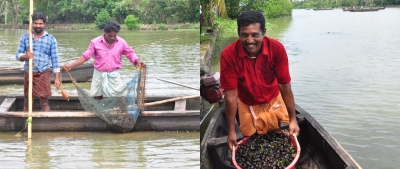CMFRI's effort helps boost clam production in Vembanad Lake
By IANS | Published: December 10, 2021 04:39 PM2021-12-10T16:39:49+5:302021-12-10T16:50:15+5:30
Kochi, Dec 10 The Central Marine Fisheries Research Institute's (CMFRI) effort to rejuvenate the black clam (Villorita cyprinoides) ...

CMFRI's effort helps boost clam production in Vembanad Lake
Kochi, Dec 10 The Central Marine Fisheries Research Institute's (CMFRI) effort to rejuvenate the black clam (Villorita cyprinoides) resource in the Vembanad lake has yielded results with fishermen harvesting good catch from the region.
CMFRI's initiative of relaying baby clams in various sites in the Vembanad lake facilitated increasing the clam production which in turn helped fishermen to harvest around 10 tonnes of clam per day from two areas of the lake.
As part of this initiative under a project on 'Rejuvenation of Clam' taken up by the Fisheries Department of Kerala using the District Panchayat Scheme, approximately 200 tonnes of baby black clams were re-laid in Keecheri and Chakkathukadu areas of the Vembanad lake under the technical guidance of CMFRI.
According to the CMFRI scientists, the initiative is expected to bring out a production of nearly 1500 tonnes from these sites.
The long undisturbed period of nearly two years has facilitated at least two spawnings followed by spat settlement in a new habitat, leading to the establishment of a new black clam bed in the Lake and thus enhancing the clam resource, said A.P. Laxmilatha, Head of Molluscan Fisheries Division (MFD) of CMFRI.
Relaying of baby clams led to the establishment of the resource in these areas spreading around 20 hectares and helped fishers harvest adult clams with good growth rate, she added.
"The production of black clams declined from a peak of 75,592 tonnes in 2006 to 42,036 tonnes in 2019 in Vembanad lake. Low production owing to multiple reasons and the pandemic have had cascading effect on clam fishers along the lake", said Laxmilatha.
Reaping the benefits, fishermen under the Keecheri Ulnadan Matsya Thozhilali Sahakarana Sangham collect the clams using canoes from re-laid locations and sell clam meat for 150 per kg in the nearest market. Each canoe collects 450 kg of clams per day.
R.Vidya, scientist of the MFD, CMFRI who led the project said that apart from increasing the production of clams in the area, the relaying helped clam fishers to sustain their livelihood during the tough pandemic period.
"Nearly 5,000 fishermen are involved in black clam fishery in the Vembanad lake", she said, adding that the clam rejuvenation programme greatly helped increasing the production in the backwaters that provided a lifeline to the fishers depending on clam resources in the area.
Disclaimer: This post has been auto-published from an agency feed without any modifications to the text and has not been reviewed by an editor
Open in app